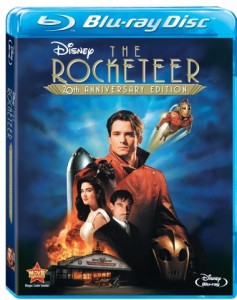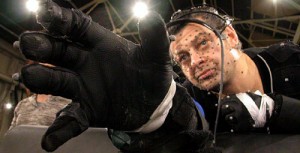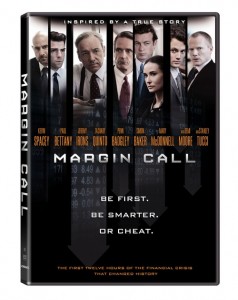 Two more shopping days until Christmas? No sweat–still time to hop on over to your favorite big box retailer and pick up a few DVDs and Blu-rays. Or, better yet, hope for a gift card, take advantage of the aftersales, and stock up on a few recent titles for yourself. (And while you’re at it, buy a Blu-ray player if you haven’t already done so. Changed my life.)
Two more shopping days until Christmas? No sweat–still time to hop on over to your favorite big box retailer and pick up a few DVDs and Blu-rays. Or, better yet, hope for a gift card, take advantage of the aftersales, and stock up on a few recent titles for yourself. (And while you’re at it, buy a Blu-ray player if you haven’t already done so. Changed my life.)
Blu-ray is the only way to properly enjoy The Rocketeer (1991), which has been trapped in an indifferent, non-anamorphic DVD since forever. Cleaned up and hi-deffed he’s flying high again, as is his director, Joe Johnston, who had a much bigger hit this year with the similarly retro Captain America: The First Avenger. So you’d think this Blu-ray, touted as a “20th Anniversary Edition,” would be a real love fest, right? Wrong–other than a standard-def trailer, it’s barren of supplementary content. You’ll learn more about the movie and its fraught production from Wiki than you will from this disc, which is a bummer for the legion of fans who’ve embraced it over the years. (So why did it flop? With apologies to the underappreciated Billy Campbell, history might have been kinder had Disney prevailed and Johnny Depp been cast as the guileless Cliff Secord, not that he was boxoffice back then. My guess is my airships theory; as soon as a zeppelin rears into view, all is lost.) Still, the transfer is decent, the action, humor, and James Horner score a treat, and the supporting performances by Alan Arkin, Paul Sorvino, Timothy Dalton (channeling a rumored version of Errol Flynn), future Lost star Terry O’Quinn (as Howard Hughes) and Tiny Ron (made up to resemble the hulking Rondo Hatton) pure RKO stock company. And Jennifer Connelly, always beautiful, is simply breathtaking here, a vision in HD.
The good news: Fright Night (1985) is available on Blu-ray in a delectable transfer from Twilight Time, the home video arm of soundtrack producer Screen Archives Entertainment, which has been doing stellar work with catalog titles from Columbia and 2oth Century Fox. The bad news: Make that was; the 3,000-unit run sold out in weeks. The worse: This summer’s remake is begging for buyers, even in a 3D edition. If you think The Rocketeer might work better today, look no further than Fright Night 2011 to see how remakes usually fare: lots of CGI and plenty of underlining and italicizing of uninteresting innovations to distinguish it from the “old one,” scrubbing the charm from the original premise. Not entirely: Colin Farrell, with this and the hit Horrible Bosses enjoying a better-paying respite from a run of indies (where he’s rediscovered his acting chops), makes for a seductive vampire, and, while no Roddy McDowall, former Doctor Who David Tennant (still trying to crack the American market at large) is amusing as his nemesis, a drunken magician. You won’t remember much else before the sun rises. Advice: Give it to your horror addict friend, with an IOU for the original once it’s reissued.
 Rise of the Planet of the Apes has gotten plenty of bananas around here. I still think it’s overrated, more ambitious and less of a chore than Tim Burton’s straight remake to be sure, yet kind of chintzy and blandly acted. Fox, which keeps the majority of its sci-fi/superhero flicks on the lean side, didn’t seem to want to commit too many resources to a reboot. (And I’ve liked the undeniably fabulous Andy Serkis more in his other mo-cap roles.) The Blu-ray/DVD combo disc is one to go ape over, however, with lots of extra content, including two filmmaker commentaries, deleted scenes, character concept art, a documentary on great apes in the wild, and a look at the stuntwork. It’s up to you to answer the immortal question “Why cookie rocket?”
Rise of the Planet of the Apes has gotten plenty of bananas around here. I still think it’s overrated, more ambitious and less of a chore than Tim Burton’s straight remake to be sure, yet kind of chintzy and blandly acted. Fox, which keeps the majority of its sci-fi/superhero flicks on the lean side, didn’t seem to want to commit too many resources to a reboot. (And I’ve liked the undeniably fabulous Andy Serkis more in his other mo-cap roles.) The Blu-ray/DVD combo disc is one to go ape over, however, with lots of extra content, including two filmmaker commentaries, deleted scenes, character concept art, a documentary on great apes in the wild, and a look at the stuntwork. It’s up to you to answer the immortal question “Why cookie rocket?”
Looking for action? Look no further than the excellent Point Blank, which is not a remake of John Boorman’s 1967 neo-noir classic (not that anyone would mind finding that in their stocking). Fred Cavaye’s film is a straight-ahead thriller (all of 84 minutes long) about a nurse (Gilles Lellouche) whose pregnant wife is kidnapped by gangsters, who expect him to spring their leader (Roschdy Zem, a familiar face from the French-made hits Days of Glory and Indigenes) from his hospital bed, which gets other goons involved, which gets the flics on his tail…I’m almost out of breath recounting it. Magnolia and its Magnet subsidiary are expert at retrieving foreign cinema from off the beaten path, and Point Blank, presented in a handsome transfer that includes a making-of documentary and the movie’s trailer, is a catch.
 Let’s go deeper into overseas movies. I fell in love with Seijun Suzuki’s Tokyo Drifter (1966) and Branded to Kill (1967) when the Criterion Collection brought them out on DVD in the late 90s, and I’m simply bowled over by the new Blu-rays: the former is a riot of Pop Art color, while the latter is a cold black-and-white. Chafing against formula, Suzuki takes generic plots–a reformed killer lured into one last job, a hit man who is to be hit himself after a bungled job–and scrambles them into wildly expressive takeoffs with girls, guns, and gangsters, with an occasional musical digression thrown in. (The two films, cult movies since their wider availability through Criterion, ended his career with the Nikkatsu studio and triggered a lengthy wrongful termination lawsuit.) Even by the standards of Japanese outlaw cinema there’s nothing quite like them, and the 88-year-old director is on hand to discuss them in new interview segments.
Let’s go deeper into overseas movies. I fell in love with Seijun Suzuki’s Tokyo Drifter (1966) and Branded to Kill (1967) when the Criterion Collection brought them out on DVD in the late 90s, and I’m simply bowled over by the new Blu-rays: the former is a riot of Pop Art color, while the latter is a cold black-and-white. Chafing against formula, Suzuki takes generic plots–a reformed killer lured into one last job, a hit man who is to be hit himself after a bungled job–and scrambles them into wildly expressive takeoffs with girls, guns, and gangsters, with an occasional musical digression thrown in. (The two films, cult movies since their wider availability through Criterion, ended his career with the Nikkatsu studio and triggered a lengthy wrongful termination lawsuit.) Even by the standards of Japanese outlaw cinema there’s nothing quite like them, and the 88-year-old director is on hand to discuss them in new interview segments.
Revisit the colonial era in glorious Technicolor in The Four Feathers (1939), a Criterion reheat of an old chestnut from MGM’s vault. There are six versions of A.E.W. Mason’s tale of British cowardice and derring-do in the Sudan (the most recent, in 2002 with Heath Ledger, was past the sell-by date despite greater nuance toward the Mahdist combatants) but this is the best, a movie that stirs the spirit in the manner of Gunga Din and Beau Geste, also released that legendary year. (Miklos Rosza’s score is an asset.) The war stories from Zoltan Korda’s set, notably Oscar-nominated cinematographer Georges Perinal’s running battle to keep the color equipment rolling amidst primitive conditions on location, are as compelling as the one before the cameras. Supplements include a commentary by British film historian Charles Drazin and an interview with Korda’s son David about his storied family.
Zoltan and Alexander Korda co-produced the subsequent fantasy The Thief of Bagdad (1940). Playing the title role at age 16 was the wildly popular Sabu (born Selar Shaik), an import from India whose father was an elephant driver. That exotic background and Sabu’s effortless appeal made him a natural for the Kordas, who cast him in a number of successful films. Three of them are collected in the Criterion Eclipse set Sabu!: his 1937 debut, Elephant Boy, co-directed by Zoltan Korda and documentarian Robert Flaherty; The Drum (1938), another Mason-based adventure directed by Korda; and his most memorable role, as Mowgli in Korda’s film of Kipling’s Jungle Book (1942), finally in a decent approximation of its original color. These are bound to be sentimental favorites of anyone who grew up with the Late Show, and Sabu (later a World War II hero and an American citizen who died abruptly at age 39; biography please!) is entirely capable of making new fans. (You can sample The Four Feathers and some of Sabu on Turner Classic Movies on Dec. 26.)
 The teenaged Kate Winslet and Melanie Lynskey have gone on to bigger, if not always better, things, than Peter Jackson’s sublime Heavenly Creatures (1994), the movie that showed there was more to the New Zealand wunderkind than puppets and gore. With its undercurrent of fantasy (those visions of Orson Welles!) I was staggered by this very unusual true crime movie, an Oscar nominee for its screenplay, and the Blu-ray presents the uncut version of the film more resplendently than the DVD. I did laugh, though, at the cover art, which gives equal weight to the leads’ co-stars. I’m sure Sarah Peirse’s mom is pleased.
The teenaged Kate Winslet and Melanie Lynskey have gone on to bigger, if not always better, things, than Peter Jackson’s sublime Heavenly Creatures (1994), the movie that showed there was more to the New Zealand wunderkind than puppets and gore. With its undercurrent of fantasy (those visions of Orson Welles!) I was staggered by this very unusual true crime movie, an Oscar nominee for its screenplay, and the Blu-ray presents the uncut version of the film more resplendently than the DVD. I did laugh, though, at the cover art, which gives equal weight to the leads’ co-stars. I’m sure Sarah Peirse’s mom is pleased.
I’m a little late for the 70th anniversary of Pearl Harbor Day but history buffs can appreciate the expensive, and sober, Tora! Tora! Tora! (1970) at any time of the year. Co-directed by the undervalued Richard Fleischer (20,000 Leagues Under the Sea) and Kinji Fukasaku (of an eclectic career that included The Green Slime and the controversial Battle Royale) it’s a meticulous recreation of the intrigue that led to the attack and the assault itself, an Oscar-winning barrage of special effects that the distasteful Pearl Harbor could not top with CGI 30 years later. Free of Michael Bay’s hottie nurses and jingoism it’s a thoughtful spectacle, and a gorgeous Blu-ray, that retains the excellent supplements from a prior DVD release and includes for the first time the longer Japanese cut of the movie and some haunting Fox Movietone newsreels from the era.
 Kirk Douglas just turned 95. In terms of movies there are better ways to celebrate than with the four-disc Kirk Douglas: The Legacy Collection, a ragged bunch of public domain odds and ends that really gets ugly with disastrous non-anamorphic transfers of two obscure 70s films, To Catch a Spy (1971) and The Master Touch (1972). Not faring all that well image-wise either are his 1946 debut in the excellent Barbara Stanwyck noir The Strange Love of Martha Ivers, which is worth seeking out in its legitimate release, a passable comedy, 1948’s My Dear Secretary, and a so-so 1952 Western, The Big Trees. Elsewhere there is however some value in getting this, as it does collect a lot of Kirk: TV appearances, a 1991 biography, 32 trailers, and, as a bonus, 27 of Michael’s. May there be more from both gentlemen the next time their pasts are recycled.
Kirk Douglas just turned 95. In terms of movies there are better ways to celebrate than with the four-disc Kirk Douglas: The Legacy Collection, a ragged bunch of public domain odds and ends that really gets ugly with disastrous non-anamorphic transfers of two obscure 70s films, To Catch a Spy (1971) and The Master Touch (1972). Not faring all that well image-wise either are his 1946 debut in the excellent Barbara Stanwyck noir The Strange Love of Martha Ivers, which is worth seeking out in its legitimate release, a passable comedy, 1948’s My Dear Secretary, and a so-so 1952 Western, The Big Trees. Elsewhere there is however some value in getting this, as it does collect a lot of Kirk: TV appearances, a 1991 biography, 32 trailers, and, as a bonus, 27 of Michael’s. May there be more from both gentlemen the next time their pasts are recycled.
Finally, a new movie, one that’s actually still playing in theaters and on demand, the acclaimed Margin Call. Given its additional appearance on numerous top ten lists its appearance as a nicely supplemented DVD and Blu-ray seems premature to me, but I’m glad to have it, as it’s a strikingly assured feature debut from writer/director J.C. Chandor. With a superior cast in tow (Kevin Spacey and Jeremy Irons are splendid) he wades into the complexities of the economic meltdown and emerges with a devastating portrait from the corridors of power, all loosely, credibly fictionalized. Best to have yourself a merry little Christmas with whatever money you have left and attend to it after the holiday glow has faded.





Comments